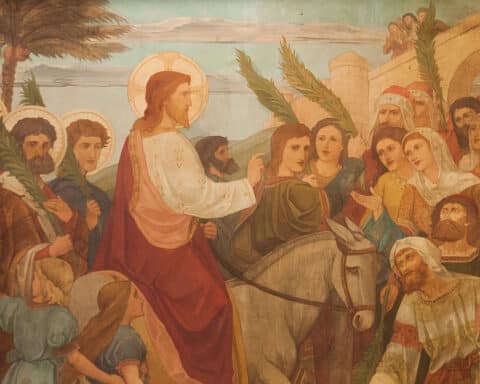
This captures one dimension of biblical prophecy. The prophets often spoke uncomfortable truths to the kings and ruling class of their day, calling the kingdoms of Israel and Judah back to fidelity to the Law.
And yet, the source of the prophet’s spoken word was not a personal decision to stand up for what was right. Rather, the prophet is haunted by the burning, sanctifying presence of the Word of God.
God chooses the prophet. The prophet does not choose this vocation for himself.
In Deuteronomy, Moses speaks to the people about the nature of prophecy. On Mount Horeb, the people asked for a prophet to mediate the fiery word of God to them.
| January 31 – Fourth Sunday in Ordinary Time |
|---|
|
Dt 18:15-20
Ps 95:1-2, 6-7, 7-9
1 Cor 7:32-35
Mk 1:21-28
|
God promises a future of prophecy but with two important caveats. First, those who do not listen to the divinely chosen prophet will suffer the consequences. Second, those who assume the mantle of prophecy but are not chosen by God will die.
This background of prophecy is taken up by Jesus in his teaching in the synagogue at Capernaum. There is authority in his speech, a power that does not seem to come from his own charism.
His word is effective. Through speech, the power of God’s word casts out demons from a suffering man.
These demons know who he is. He is the Holy One of God. He is the one chosen, the prophet of all prophets.
And that is where the lectionary leaves us for now. Jesus is the one who possesses a unique authority, a power that does not come from him alone.
We know more than the lectionary gives us. Jesus is indeed a prophet, who teaches with absolute authority. His prophecy extends to the wood of the cross, taking upon himself the sins of the nations. In his death and resurrection, we experience the power of a divine fidelity that surpasses anything that we could construct on our own.
God is with us. God will defeat death. God has defeated death through the blood of Our Lord.
The lectionary does not rush us to that point. It invites us, like those early disciples, to a process of self-examination.
Do we obey the authority, the power of the divine Word, spoken by our prophetic Lord?
We have already heard in the Gospel of Mark that Jesus has come into the world announcing the advent of the kingdom of God.
Do we live as those abiding in this kingdom? Do we listen to the teaching of our Lord, haunted by the authority that surpasses any human exercise of power?
In our churches each day, the living word of Jesus Christ is spoken. In our homes, the speech of God is given flesh as we speak it aloud in morning and evening prayer.
In the Eucharist, this word is spoken anew, given flesh in what looks like bread and wine. It is the prophetic word of a fidelity in which God intimately dwells among us, feeding us as sheep who have found the most gracious of shepherds. This is my Body. This is my Blood.
The prophetic authority of Jesus matters not just for those early disciples but for us, the Body of Christ gathered today.
And like the people of Israel of old, we have a choice.
Do we listen, or do we not?
Timothy P. O’Malley, Ph.D., is the director of education at the McGrath Institute for Church Life at the University of Notre Dame.





